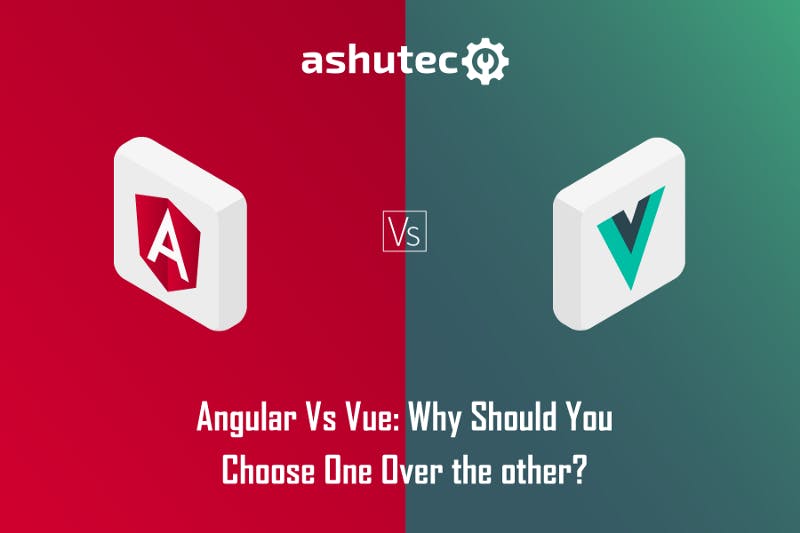Let’s Connect!
Work can be a fun when we know and understand each other well. Let's start conversation to new beginning
+91 63542 35108
To discuss what we can do for you Give us a Call
connect@ashutec.com
Tell us about your next project Write to us

Frontend development frameworks have recently gone through a drastic change. They have evolved significantly and have become game-changers. The two most prominent frontend development frameworks we know today are Angular and Vue. Selecting one over the other is a tough nut to crack for many web app owners and even for developers.
Angular is an advanced and mature TypeScript-based framework from Google. Recently, the Angular team at Google has released v13 of the framework. We have already discussed what’s new in Angular 13 and what makes it tick for enterprise frontend development.
Vue, on the other hand, is a progressive JavaScript-based framework developed by one of the former core team members of Angular. The framework is lightweight, versatile, simple and is created to build complex user interfaces.
But when it comes to choosing one over the other, many seem to be in a dilemma. Since I’ve already talked about React vs Angular, it’s the right time to clear the air between Angular and Vue and which one is more suitable. So, without further delay, let’s begin:
Angular is renowned as a high-performance framework to develop highly interactive and scalable web frontends. Since the framework is powered by the Ivy renderer, which promises to make the web frontends faster and more compact. Frontends developed with Angular have unmatched performance and reduced development time.
The performance of Vue was not up to the mark in the past, but luckily, it has virtual DOM, which helps in optimizing the performance of Vue-based frontends. Additionally, the framework offers Lazy Loading to further improve the load time and performance.
Angular offers an MVC (model-view-controller) architectural pattern. What this type of architecture does is isolate the logic from UI layers to support the separation issues efficiently. Based on the design performance variation, the architecture also organizes the code components.
The two-way data binding in Angular is an integral function of the architecture unlike other web frameworks, which use fragile event listeners and handlers. Designing frontends with neat user interfaces and smooth business logic is possible in Angular.
Vue focuses on the ViewModel architectural approach and undertakes the MVVM approach when developing large-scale complex applications. Here’s the breakdown of M V VM:
Model: It’s similar to JavaScript’s Model object where data instance is transferred to reactive element when the data object enters the Model part to create storage layers.
View: Here, the actual management of DOM takes place where DOM-based templates successfully create root elements.
ViewModel: It handles the synchronization of View and Model parts.
Since Vue is not a full-blown framework like Angular but has a view layer pattern, which makes the development of frontends simple and flexible.
Backed by Google and other established corporations, Angular is full-fledged and well capable to create enterprise-grade applications. The powerful command-line interface of Angular gives it the scalability frontends need. The framework is also able to easily organize the large codes for complex applications to provide a scalable project structure.
Vue is a lightweight framework and is mostly used for creating small-scale projects with no expansion or scalability in mind. However, the scalability in Vue applications can be achieved through forking and breaking down the repositories. This makes scalability convenient as required due to the dynamic architecture of the application.
Angular frameworks have some built-in provisions to prevent cross-site scripting vulnerability that client-side frontends need protection from. Angular has a tendency to treat each value untrustworthy by default since there’s no guarantee that the attacker might enter malicious code by any means. Other security features include updated libraries, updated security policy, and the use of AOT for compiling HTML.
The creator of the Vue himself said that the built-in provisions would add extra weight. Thus, there is no protection against vulnerability attacks like cross-site scripting. However, adding external libraries or sanitizing the HTML code may offer the chance to fight against security threats.
Thanks to its significant ability to offer a great user experience, Angular is the preferred choice by enterprises for their web frontend development. The framework is divided into segments to manage the user interactions through the template. Angular manages the display of the data in a more sophisticated way.
Vue, with respect to Angular, races ahead in developing the eye-catchy web frontends thanks to the tech stack they offer. The platform has more room for experimenting with different user interfaces designs that look more professional. Thus, Vue is an ideal choice to offer the best possible user experience.
As we have already mentioned, Angular is best for large-scale enterprise application development. Enterprise web applications tend to be bigger in size, which can be compiled and compressed into small bundle sizes.
Since Vue is already a lightweight framework, which is why the application size of Vue is small compared to other frameworks. Vue apps might initially look bigger in size due to the Vue CLI when the code loads for the first time. But when lazy loading kicks in, codes are broken down into smaller pieces.
On paper, Angular looks quite more powerful than Vue and clearly the most preferred choice for enterprise applications. However, Vue has also not remained far behind. There is still quite a lot of room for improvement for Vue to reach the level where Angular is today.
It would have to improve quite a lot more rapidly than other platforms. If you are an enterprise looking for the best frontend development framework out of Angular and Vue, Angular is the best choice for now.




